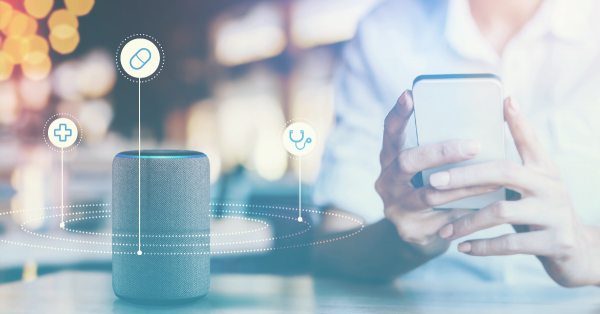
The addition of machine learning and deep learning to natural language processing has the potential to transform patient interactions, from calls to health plans to remote monitoring for clinical trials. Few companies understand this better than Orbita, which provides voice and chatbot-powered virtual assistants for voice platforms like Amazon Alexa — the “voice” behind Amazon’s Echo devices.
Although mainstream adoption will take time, the long-anticipated milestone of Amazon’s Alexa Skills Kit becoming HIPAA-enabled has new implications and clinical potential for improving patient engagement in remote care and monitoring applications.
Orbita SVP Strategy and GM Healthcare Providers Kristi Ebong is taking part in a panel discussion at the MedCity INVEST conference April 23-24 in Chicago called, “What Can Alexa/Voice Do for Healthcare?” It will focus on how voice is being used, who the players are and killer applications you may not know about. In addition to Ebong, panelists include John Brownstein, Chief Innovation Officer, Boston Children’s Hospital; Tal Wenderow, President & CEO, Beyond Verbal; and Alyssa Jaffee, Vice President, 7wire Ventures will serve as the moderator.
Orbita has long believed in the inevitability of virtual assistants finding their way into clinical applications. Amazon’s announcement makes this belief a reality and, according to Orbita, opens up a whole new array of applications for Alexa in healthcare. The greatest benefit of voice for healthcare, from Orbita CEO and co-founder Bill Roger’s perspective, is reducing friction in patient engagement.

Bill Rogers
“Healthcare organizations will embrace this technology as a lower-cost complement and even alternative to traditional call centers. Common questions like, ‘What about my copay?’can easily be handled by a virtual assistant, which will immediately improve engagement. Every healthcare organization will want to adopt this because it will reduce the friction with consumers and reduce costs.”
As of January last year, 39 million people in the U.S. owned a smart speaker — a majority of them are powered by Amazon Alexa. A key reason for this massive adoption is because voice assistants like Alexa have gotten much better at recognizing human speech. These improvements have led to fewer people getting frustrated with voice assistants and more people engaging with this tech. Rogers also regards conversationally-enabled technologies like Alexa as a way to break down barriers that have inhibited seniors from adopting other digital healthcare technologies, like smartphone apps, in more meaningful ways.
Explaining aspects of deep learning’s impact on natural language processing, Rogers said the voice technology has the power to adapt to different accents and understand different ways of saying the same thing — something that wasn’t possible just four to five years ago.
Another area that excites Rogers is the potential for voice tech to improve medication adherence. He notes that the first 24 hours of a prescription drug being ordered for patients is critical to determine whether the patient will take the medication and its impact. Did they pick the medication up in the first place? Did they take it, but stopped? Orbita virtual assistants can simultaneously provide value to the patient while gathering important information to help with care plan adherence. Understanding how a patient communicates adverse side effects of a drug, the ability to recognize medication names and their variants, and offering to escalate the patient to a live clinician at the right time are revolutionary capabilities for a virtual assistant to provide in a healthcare journey.
“Chatbots can ask, ‘Are you taking your meds? Do you plan to take your Coumadin? I’m sorry you’re not feeling well, can I ask you a few questions to try to help?’ These are the kind of questions that a physician would ask. If the patient says something costs too much money, then the virtual assistant empowers clinicians with more specific context to address,” Rogers noted.
Another important point is that bots and voice assistants are advancing automation in healthcare.

Kristi Ebong
“We are going beyond transactional or one-way Q&As, like ‘when do I take my medication?’, to more conversational interactions that truly engage patients,” said Kristi Ebong, Orbita SVP Strategy and GM Healthcare Providers. “There’s nothing worse than a data aggregating machine that provides little or no value to the patient. Conversational technology allows us to bring patient-centered value in an operationally efficient way. This is revolutionary.”
Lots of technology companies have produced “skills” for Alexa that are designed to accomplish different tasks. Orbita has collaborated with several groups to develop these skills, including the Mayo Clinic. Orbita worked with Mayo to produce a First Aid application on Alexa for home use. Ebong noted that their customers are seeing increasing levels of adoption across channels where voice-enabled first aid information is provided — initially Alexa, and more recently Google Assistant, as well as web-based, voice-enabled chatbots.
“This is not a world where if you build it, they will come,” Ebong noted. “Meeting the patient where they are as a person and a consumer is ground zero for engagement.”
The source of the content for these bots comes from trusted and established content providers who use Orbita to conversationally enable their clinical-grade content. One example includes Mayo Clinic’s Global Business Solutions organization, which monetizes health and wellness content developed at Mayo. “Mayo and organizations like it have high-value content and want affordable, intuitive tools that help them make their content accessible through AI-powered voice and chatbot experiences”, said Ebong.
“You can’t take two pages of content designed for a website and drop it into a conversational interface like Alexa. It’s not that simple. Mayo and others are benefiting from the advanced tooling Orbita provides to streamline the way existing content is used to design, build, manage, and optimize conversational virtual assistants across the enterprise.”
She added: “Context matters. For example, if someone says, ‘What are the symptoms of a spider bite?’ and then follows up with “How do I treat it?”, the voice assistant must know that, for the second question, the context is “spider bite”. Designing contextual conversation flows requires specialized tooling. Orbita has refined our platform in response to what we’ve learned from Mayo and others about how these tools should be delivered.”
Orbita envisions a host of virtual assistant applications for its technology taking hold in the future.
“The greatest potential for virtual assistants in healthcare is to seamlessly facilitate omnichannel consumer journeys starting before the patient ever sets foot in the brick-and-mortar clinic to their post-acute transitions of care,” said Ebong. “Our customers represent organizations across the healthcare delivery ecosystem including providers, payers, pharma and Fortune 500 companies who are interested in moving the needle across the patient experience.”












